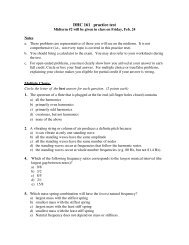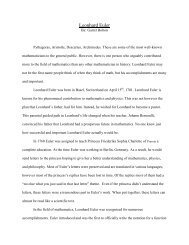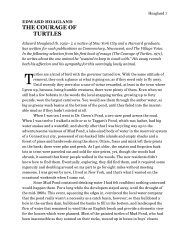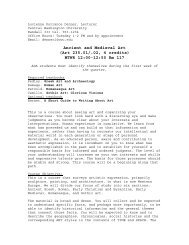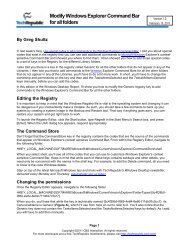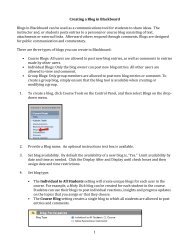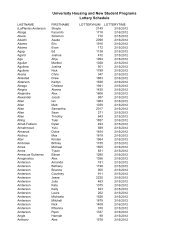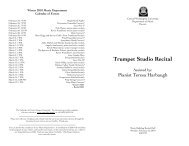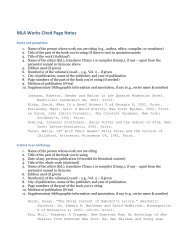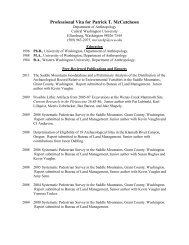The Ingenious Gentleman Don Quixote de la Mancha
The Ingenious Gentleman Don Quixote de la Mancha
The Ingenious Gentleman Don Quixote de la Mancha
Create successful ePaper yourself
Turn your PDF publications into a flip-book with our unique Google optimized e-Paper software.
<strong>Don</strong> <strong>Quixote</strong> <strong>de</strong> <strong>la</strong> <strong>Mancha</strong> 19 <br />
<br />
carrying a candle‐end, and the two damsels already mentioned, he returned to <br />
where <strong>Don</strong> <strong>Quixote</strong> stood, and ba<strong>de</strong> him kneel down. <strong>The</strong>n, reading from his <br />
account‐book as if he were repeating some <strong>de</strong>vout prayer, in the middle of his <br />
<strong>de</strong>livery he raised his hand and gave him a sturdy blow on the neck, and then, with <br />
his own sword, a smart s<strong>la</strong>p on the shoul<strong>de</strong>r, all the while muttering between his <br />
teeth as if he was saying his prayers. Having done this, he directed one of the <strong>la</strong>dies <br />
to gird on his sword, which she did with great self‐possession and gravity, and not a <br />
little was required to prevent a burst of <strong>la</strong>ughter at each stage of the ceremony; but <br />
what they had already seen of the novice knight's prowess kept their <strong>la</strong>ughter <br />
within bounds. On girding him with the sword the worthy <strong>la</strong>dy said to him, "May <br />
God make your worship a very fortunate knight, and grant you success in battle." <br />
<strong>Don</strong> <strong>Quixote</strong> asked her name in or<strong>de</strong>r that he might from that time forward know to <br />
whom he was behol<strong>de</strong>n for the favor he had received, as he meant to confer upon <br />
her some portion of the honor he acquired by the might of his arm. She answered <br />
with great humility that she was called La Tolosa, and that she was the daughter of a <br />
cobbler of Toledo who lived in the stalls of Sanchobienaya 13 , and that wherever she <br />
might be she would serve and esteem him as her lord. <strong>Don</strong> <strong>Quixote</strong> said in reply that <br />
she would do him a favor if thenceforward she assumed the "<strong>Don</strong>" and called herself <br />
<strong>Don</strong>a Tolosa. She promised she would, and then the other buckled on his spur, and <br />
with her followed almost the same conversation as with the <strong>la</strong>dy of the sword. He <br />
asked her name, and she said it was La Molinera, and that she was the daughter of a <br />
respectable miller of Antequera; and of her likewise <strong>Don</strong> <strong>Quixote</strong> requested that she <br />
would adopt the "<strong>Don</strong>" and call herself <strong>Don</strong>a Molinera, making offers to her further <br />
services and favors. <br />
<br />
Having thus, with hot haste and speed, brought to a conclusion these never‐till‐now‐<br />
seen ceremonies, <strong>Don</strong> <strong>Quixote</strong> was on thorns until he saw himself on horseback <br />
sallying forth in quest of adventures; and saddling Rocinante at once he mounted, <br />
and embracing his host, as he returned thanks for his kindness in knighting him, he <br />
<br />
13 An old square in Toledo.






